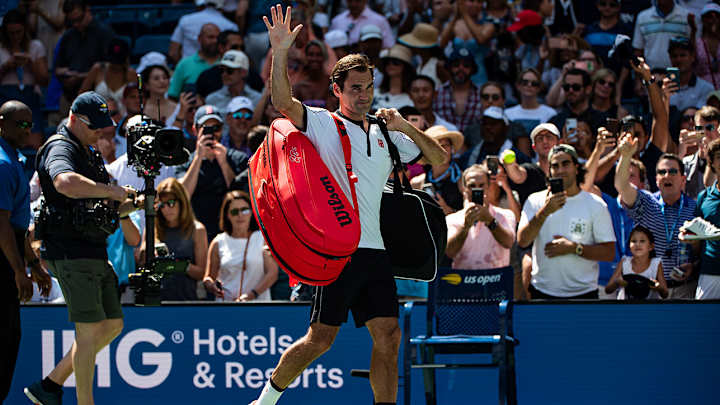Federer Bristles at Idea He Chose US Open Time; Djokovic Looks Healthy in Win

NEW YORK — There was no slow start to this U.S. Open outing for Roger Federer, who bristled at the suggestion that he might have played a role in some favorable scheduling.
After dropping the opening set in each of his initial two matches for the first time in 19 appearances at Flushing Meadows, the No. 3-seeded Federer was back at his absolute best Friday in a 6-2, 6-2, 6-1 victory over Dan Evans, accumulating a 48-7 edge in winners as the opening act in the Arthur Ashe Stadium day session that began at noon.
Evans acknowledged 20-time major champion Federer's superiority. How couldn't he?
But the 58th-ranked player from Britain also thought the timing was ''a bit disappointing,'' because his rain-postponed second-round match was played Thursday, whereas Federer got to play Wednesday under the Ashe roof.
Being first up on Friday's program meant Evans had to be back on court about 18 hours after he'd left the tournament grounds.
''It was always going to be a competitive advantage for me. ... Luck was on my side,'' Federer said, although he did add that his team was asked about whether it had a preference for when to play.
''But that doesn't mean, like, `Roger asks, Roger gets.' Just remember that, because I have heard this (stuff) too often now,'' he said, with a more colorful word choice. ''I'm sick and tired of it, that apparently I call the shots; the tournament and the TV stations do. We can give our opinion. That's what we do. But I'm still going to walk out (on court), even if they schedule me at 4 in the morning.''
Tournament spokesman Chris Widmaier would not discuss specifics of conversations between tournament officials and representatives of any player.
''That was the schedule we put forth, and we're comfortable with the decision,'' Widmaier said.
When a reporter asked Evans whether he made any requests about a later start time, he replied: ''You think a guy who has my ranking has any say in that?''
''There is probably about four people in this tournament who has a say when they play,'' Evans said. ''Maybe three.''
In the last match in Ashe at the end of the night, defending champion and No. 1 seed Novak Djokovic's left shoulder looked just fine in a 6-3, 6-4, 6-2 victory over Denis Kudla of the United States.
During his win Wednesday, Djokovic was visited several times by a trainer for treatment on the shoulder, which he said was hurting quite a bit. But that did not appear to be an issue at all against Kudla.
Whether or not he had any input—wink, wink—Djokovic surely must have been pleased to get such a late start.
''I managed to play almost pain-free,'' Djokovic said. ''That's a big improvement.''
Truth be told, Federer-Evans could have been contested at any hour on any day and the outcome might not have changed. Evans has now faced Federer three times, each at a Grand Slam tournament, and lost all nine sets they've played.
''I guess he has every shot,'' Evans said, ''so it's not ideal to have an opponent that has every shot.''
Federer, who faces No. 15 David Goffin next, displayed a bunch of them, too.
The leaping, over-the-shoulder volley packed with pace. The drop volley winners. The forehand passes. The serve with which he won 21 consecutive points in one stretch. The returns that accumulated 14 breakpoints, converting half.
Federer went from making 17 unforced errors in the first set of his previous match to finishing with 19 for the entire match against Evans.
''You almost tend to forget what happened,'' Federer said, ''and you move forward.''
Men who advanced included 2016 champion Stan Wawrinka; Alex de Minaur, who knocked off 2014 runner-up Kei Nishikori; and Dominik Koepfer, a German ranked 118th who defeated No. 17 Nikoloz Basilashvili 6-3, 7-6 (5), 4-6, 6-1 to become only the second qualifier in the last decade to reach the men's fourth round at the U.S. Open.
